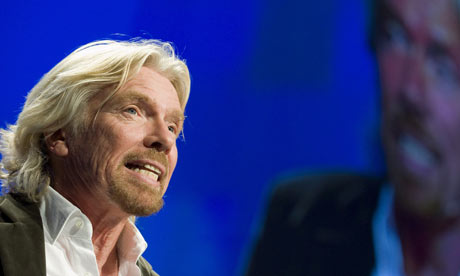
Sir Richard Branson's Virgin Active is in early discussions with a handful of private equity groups over a possible £1bn sale of the health and fitness chain.
The UK's second-biggest gym operator, which also operates in Italy, Spain, Portugal and South Africa, is thought to be exploring a possible sale after being approached by a number of big private equity houses with experience in the leisure sector, including CVC Capital Partners, KKR, Blackstone and Advent.
They would buy into a steadily expanding business, with opportunities to beef up Virgin Active's 71-strong portfolio in the UK, and to step up its expansion abroad.
Virgin Active, which is being advised by Goldman Sachs, has also been considering a flotation on the London stock market for some time, but a float does not appear imminent given the ongoing turbulence in financial markets. Branson had previously looked at floating Virgin Active in 2007 after Virgin Mobile's successful stock market debut, but plans were put on ice because of market volatility.
The company, which was founded in 1999, is 76% owned by Branson's Virgin Group, with the rest held by the management team alongside private equity firms Bridgepoint and Permira. The firms acquired their stakes when they sold the Holmes Place fitness chain in the UK to Virgin in October 2006.
Branson is expected to retain a sizeable stake in the business of about 50% if there are any changes in ownership.
Virgin Active runs 187 health clubs and has nearly 1 million members. It traded well through the recession and reported 15% growth in revenues to £391m for last year propelling core earnings 18% higher to £101m.
The firm's chief executive Matthew Bucknall and chairman Richard Baker, the former Boots chief executive, see lucrative growth opportunities abroad, particularly in Italy and South Africa.
In Italy, where Virgin Active has 17 clubs, it wants to open a further 15 to 20 within the next five years and in South Africa, its biggest territory, it plans to add up to 15 new gyms to its 91-strong portfolio. The group also wants to roll out the recently acquired Virgin Life Care business that provides health measurement products and tailored exercise and dietary programmes in South Africa. The plan is to launch it across the group in the next two years.
Virgin Active has mainly expanded through acquiring local businesses. In South Africa, it bought a business out of receivership and successfully turned it around. The company is mulling a move into the US, the biggest health and fitness market in the world, although plans remain at an early stage.
In the UK, Virgin Active plans no further gym openings at present.
The private equity owners of rival Fitness First are eyeing a stock market flotation in Asia next year, which would value the world's biggest gym group with 550 health clubs at up to £2bn. BC Partners is considering whether to push ahead with a float despite market turbulence. It favours an Asian listing as the region is regarded as a more lucrative source of future growth.
Other private companies that were headed for a stock market float this year but plumped for a sale to private equity investors instead include the 250-strong Pets at Home chain, which was sold by Bridgepoint to rival private equity investor KKR in a £955m deal in January.
Theme park operator Merlin Entertainments also abandoned plans for a stock market debut and instead sold a 28% stake to CVC a month ago.
Online retailer Ocado went ahead with its listing but was forced to slash its float price and received a lukewarm welcome on its stock market debut this month.
Virgin Active declined to comment.

